What happens when you have been setting the standard for excellence in Bible Study for over 100 years and you add in the most literal English Translation of the Bible? Well, you get the Thompson Chain Reference Bible in the NASB (1977) Edition. Few Bibles, if any, deserve to sit on the same shelf as the Thompson Chain because so few have what it takes to open the Scriptures up for us.
What makes the Thompson so outstanding?
“A Thompson® is the only true “Influence-Free” Study Bible. This is the one very important difference between a Thompson® and most other study Bibles. Most study Bibles fill their margins with another person’s commentary. These are notes from a knowledgeable author who tries to explain the text to you. Commentaries can be useful, but every author has his or her own view and biased agenda. Commentaries offer wide and often opposing influence. Your Thompson® Bible is “influence-free,” because instead of commentary, our margins are filled with thousands of chain-references® that propel you ahead into Scripture. Scholars agree that the Bible is its own best commentary, and no other study Bible helps you go deeper into the Scriptures than aThompson® Chain-Reference® Study Bible.”
1. Every Thompson Chain Bible has over 8,000 completed chain topics. These topics take every important verse of scripture and codify it into topics that can be traced from Genesis to Revelation. Operating under the principle that Scripture interprets Scripture, these chains take you through each topic in such a way as to allow the Bible to illuminate itself and guide you into deeper understanding of the Bible.
2. Outline Study/Analysis of each Book. In the Helps Section, found in the back of the Bible, every book of the Bible is presented in outline form. Each outline serves as an excellent guide to expository study of the Bible.
3. Updated Archaeological Supplement. The Archaeological Supplement brings the Bible to life in a new and exciting way. Each article is keyed to the Thompson Chain Reference System allowing you to see how recent discoveries support and affirm the truths of the Bible.
4. Character Outline Studies. Character studies not only highlight the major players of the Bible, they also provide background information as to the condition of the society at their time, and how the character relates to God and to redemptive history.
5. Harmony of the Gospels. The Harmony of the Gospels Supplement is as straightforward as it is useful. Each story from the life of Christ is listed along with the corresponding passages from the Gospels. This is an excellent resource for an in-depth study of the life of Christ.
6. Portraits of Christ. Portraits of Christ provide 7 different views of the Lord’s character as seen by Isaiah, Matthew, Mark, Luke, John, Peter, and Revelation.
7. Bible Atlas (13 maps). Many of the maps in the Bible Atlas are keyed to the Thompson Chain. You not only get to picture the lands of the Bible, you can also easily trace the journey of many of the key players.
As with all Thompsons, The NASB Edition is smythe sewn to lay flat. This is important for those of us who write in our Bibles. This is a Red Letter Edition, which is uncommon for the NASB. The red is quite crisp and is easy to see in any lighting condition.
Ordinarily, an 8-point font would pose a problem for me but in this edition, the typesetting, page coloration, opaqueness, and quality of the black ink make the text very easy to read. The paper is around average in its opaqueness; you will be able to mark in this Bible with minimal bleed through, if any.
A word about the NASB: The NASB is widely regarded as the most literal English Translation available. This leads to some people accusing it of feeling wooden. The Lockman Foundation acknowledged this with the 1995 update and the new slogan that “the most literal is now more readable.” It’s difficulty is around a 10th-11th grade reading level. It is not, by any stretch of the imagination, a liturgical sounding text. It does feel academic when reading. For those that do not enjoy a text like that, the Thompson is also available in NIV (original 1978 Edition), KJV (The original offering), and NKJV. At this time an ESV is not available and it is not known whether or not Kirkbride Bibles intends to offer the ESV.
The Thompson is the student’s Bible. The only thing it lacks is a Hebrew/Greek Lexicon. This, however, is not an issue when using the NASB as the extensive notes include lexical helps. An affiliate link is provided for those that wish to purchase.
I must confess that I am a little enthusiastic about Thompson. I have two Thompson Chain Reference Bibles, 1 that is over 40 years old that was passed down to me by my grandfather (this was the first Bible I taught from.) and this edition. Note: this Bible was purchased for my own personal use; it has not been provided to me by the publisher.

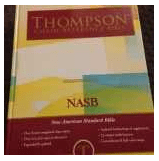


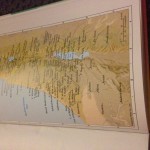


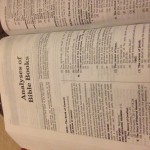
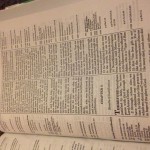
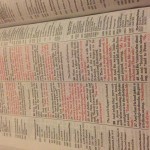

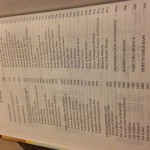
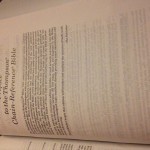
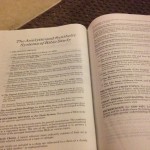
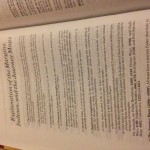
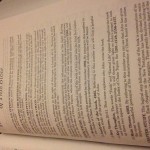
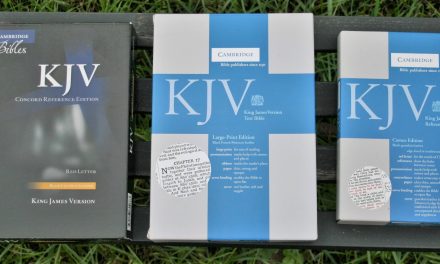

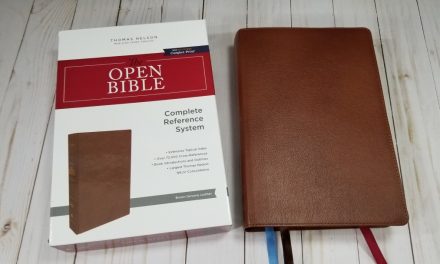
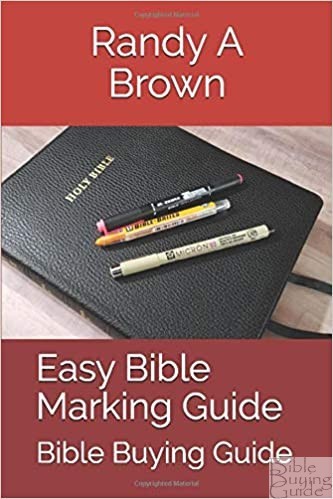
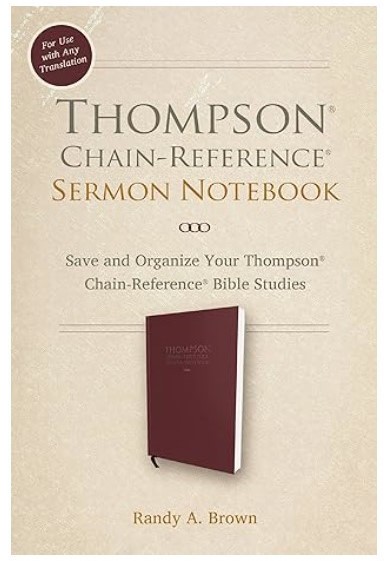
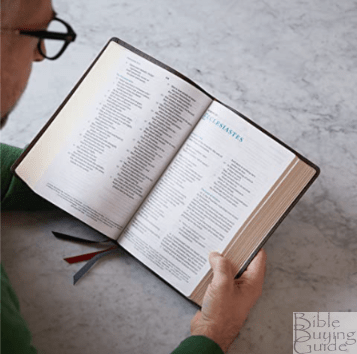


Dear Randy:
It is good to see the Thompson available in NASB for those who prefer that translation. I agree that it is a very literal translation, the problem for me is that they used the Critical Text as well as the Received test of the New Testament in making up their bible. I am suspicious of the Critical Text, evidently it comes from archived material (that was why it survived) that was suspect even when it was new. The manuscripts from which the Received Text were derived, just wore out, they were respected, used, copied and not stuck in some archive as were the Sinaitic and the one found in Vatican archives, because even the ancients regarded them with suspicion.
The Thompson even in the Authorised Translation (KJV) has contained in its notes information based on the Critical Text, I believe that this is why LCBP is no longer producing it, they are committed to KJV only. I have a LCBP Thompson’s Chain Reference, and use it frequently; one should be aware however that the use of the Critical Text in the notes and other appendices are there.
These are fine bibles and excellent tools for study, I like mine, but regard the notes etc. much as I do the Schofield Bible for the same reasons. You have done your usual good work on this review.
Yours in Christ
Don Denison
Don:
Thank you for you comments. Since I provided this review (not Randy), I would like to provide some background on the NASB and why I chose it. (I would never want to cause a brother or sister to stumble).
First, a llink to som information on textual criticism, http://en.wikipedia.org/wiki/Textual_criticism Also, we must remember that any time any person studies the Bible in the original languages and translates into English, he or she engages in textual criticism.
Secondly, and please understand, I am not trying to troll anyone, the questions of textual criticism seem to only come up from the KJV Only crowd. The fundamental problem with that is that KJV is not a new/unique translation either. It is actually a revision of the Bishops Bible and was in response to the growing clout of a vociferous group of Puritans. That the KJV has set the standard for 400 years is testament to the excellence of the learned men who performed the work. That being said, it is not the only acceptable translation.
NASB and its close cousin the ESV are both very literal translations. I spent 2010-2013 carefully researching the various translations available and decided, based on the literalness of the translation. I noticed that common questions include the Johanine Comma (1 John 5:7) and the beginning part of John chapter 8.
Many people confuse the Critical Text (the Nestle-Aland) with the Westcott-Hort Text. Westcott-Hort is actually the UBS Greek New Testament. After consulting with several Greek Professors here in my home town, I chose the NASB since it is based on what is doubtlessly one of the best Greek New Testaments available.
I want to state, emphatically, that if my use of NASB offends you or any other reader of this site, I am sorry. I do not wish to offend anyone. I simply want to help others. I hope, Don, that I have not offended you by promoting the NASB.
Dear Matthew:
There is no offense taken. Perhaps I was not sufficiently clear about why I prefer the Authorised (KJV) translation. It is only because I believe the texts from the 4th century are suspect, and that most 4th century scholars were suspicious of these texts as well, that is probably why they were tucked away and not used up in copying and handling over the centuries. Those manuscripts from which the Received Text were drawn, were handled to death and did not survive because of that. I think it is misguided to rely on documents that were not even respected enough by contemporary scholars to use in producing the New Testament. Manuscripts that are shoved aside, archived, and forgotten because of suspect content, should not be relied on in my view.
I am sufficiently aware of the shortcomings of the Authorised version last edited I believe in 1769 (?), and originally released in 1611. I often use, and respect, the Douay Rheims translation of the Vulgate, edited by Bishop Challoner (sp?), I believe in the 18th century. The Received Text has its own problems, Erasmus in doing his work often consulted the Vulgate for example, but on the whole, I believe it is the most reliable of all. I welcome a new translation using the Received Text in modern language, I don’t understand why suspect manuscripts are used in all the new translations, oldest does not mean the best, or even most accurate. Surely common sense and scholarship should override the excitement of the discovery of those texts, I believe in the late 19th Century, in many areas where they differ, the best of the assertions of the Deity of Christ are weakened or omitted . I believe these manuscripts were traced to the scholarship in Alexandria during a time when the complete Divinity and the Lordship of Jesus Christ was under attack within that group of scholars. I may be in error, I have been before, and will be again, but my suspicions are aroused, and because of that I will hold to the Authorised version until something better comes along.
The NASB is perhaps the best of the Modern Translations of the bible, I bought one when it first came on the market and used it for several years before reluctantly returning to the Authorised. I do not maintain that the Authorised has no problems, only that it is the best we have at the present time, it is also written in elegant and beautiful English. I am not a wild eyed emotional Bible Bigot, I’m just disappointed in the Modern Translations of which the American Standard and the New American Standard are in my opinion the best. If you believed that I am among the noisy KJV Only crowd, I would take offense, as I believe many of them are ruled by emotion and not reason. If any of you all choose a translation, whatever it is, be aware of its shortcomings, THEY ALL HAVE THEM, and read your bible! Pray and ask the Holy Spirit’s guidance, and read your bibles regardless of which translation you have chosen!
Yours in Christ
Don Denison
Nice review and outline of the NASB Thompson Chain and this is the first time I’ve seen the internals of the NASB Thompson and the font looks very readable. In regards to the NIV, at one time Kirkbride was selling the 1984 text, but I guess they’ve ran out of the ’84 NIV, since they are now selling only the ’78 NIV. I’m wondering what’s next for Kirkbride, especially since Zondervan no longer license’ the 84 NIV. The Thompson Chain Reference Bible has stood the test of time and is probably over 100 years old by now. But, i’m concerned about Kirkbride as a company and the Thompson Chain and it would be disappointing too see this company go under. Currently Kirkbride is selling the older texts of the 1977 NASB and the ’78 NIV and at some point I’m thinking they’ll have to retool and start using the updated texts to remain competitive in the current market.
Don, It’s disappointing to read dispersions being cast upon the contents of the Thompson Chain, all because it doesn’t match someone’s perceived acceptable doctrinal views. And, whatever differences there are between the various translations or texts these differences have no impact on sound Christian Doctrine. And the accusation that the best assertions of the Deity of Christ are weakened or omitted is also false. If a scripture has been omitted, I can almost guarantee you it is found somewhere else in the text or translation and it is stated even more clearly. Now, there are passages in the KJV that are not found in any of the Greek texts, so that might be what you are alluding too. There’s a lot of misinformation out there, but the Scriptures are authoritative and all of the major translations modern or otherwise contain the same gospel message. As Christians we should spend more time promoting the Gospel message and not a particular translation or any propaganda which attempts to weaken the authority of the Scriptures. It is a miracle of God that we have all of these great translations/witnesses available backing each other up in defense of the Gospel and also for use as witness tools. I can assure you that GOD is fully capable of protecting and preserving His Word and He has. And, for all of those out there that feel nostalgia or traditionally prefer the King James translation, the companies that sell the modern translations also sell the King James translation, so there is no conspiracy to supplant the King James or any particular text. And if you’re looking for a modern translation that faithfully represents the Textus Receptus, regardless of what you might have read or heard, the NKJV is a great bible in that regard.
http://www.bible-researcher.com/kutilek1.html
Dear Norm:
Believe me, my choice of the Authorised was reluctant because of the well known problems it poses. I have, owned and used the NASB for years, I still own it, I bought it when The Lockman Group first published it back in the early 70’s and used it heavily before I went back to the Authorised. I believe my views about the minor problems between the different translations are well supported by good scholarship. For a good selection of scholarly articles that detail these views, go to the Articles pages found on the Trinitarian Bible Society’s website. The problems I cited are not so great that I would pronounce modern translations heretical, and we all know that there are problems with the Authorised Translation. My point is rather that one should be aware of the problems in all translations from original languages in any bible. I don’t think doctrine is materially threatened, but one should always be aware of the problems that do exist. To maintain that every translated word and punctuation mark made is hard and fast and is involved in doctrinal differences would be foolish. There are many ways a good translator can render a given passage, or even word, and still be accurate. More important are the decisions to delete whole passages based on what many believe are questionable documents. It has taken years for me to be comfortable with my decision to return to the Authorised version of the bible, even now, if a translation that I trusted were published using the same texts in modern language, I would probably prefer that. I believe it was probably in 1981-1982 or thereabout that i returned to the Authorised. I have by now become accustomed to the 1769 (?) language of its last editing, I have always enjoyed the elegant and scholarly English that it is rendered in, but for years had some difficulty with it.
Norm I am sorry that my comments have distressed you, perhaps I should have just remained silent on what is obviously a Hot Button issue. Believe me I am not a wild eyed KJV only Bible Bigot, I have thought about the issues of the different translations, and don’t question the readers of the modern ones about their doctrine. The deletions are there, for whatever reason, and Thompson’s notes have content reflecting this and other minor problems. I believe that this is why LCBP has not published any more of this bible. I had to look very carefully to find the notes involved and thought they were not terribly serious, and mostly petty, but were at least as serious as the notes in the Schofield, but in a different way. It is curious that LCBP has discontinued publishing the Thompsons for these minor difficulties (so I have been told), but continue to publish the Schofield that has the same problems. Again, my position is that one should be aware of these and other issues in all of the translations before they make a choice, there are good and sufficient reasons to make a reasonable choice of any modern translations, (except The New World Translation) as well as the older ones, the Bishops Bible, the Geneva Bible, the Authorised, and the Douay Rheims. I am not a rock thrower, I, perhaps unwisely, expressed the reasons I reluctantly made the choice I made, perhaps I should learn to read Greek, Hebrew, Aramaic, and read in the original languages, I should also freshen up my Latin so I can read Jerome’s Vulgate. By the way, not all of the best assertions of Christ’s Deity are omitted, but enough were, to make me nervous since I don’t read Greek. Please consult the articles found on TBS’s website that pertain to translations. I promise, I’ll never again post on these matters unless someone asks me to as it seems that it is a sensitive area to many, and is subject to misunderstanding.
I do regard the NASB as the best of the modern translations, it perhaps is so committed to accuracy that at times is a little stiff. As I said earlier I reluctantly returned to the Authorised. I hope that this clarifies my postings, and reassures you about them.
Best regards to you and yours.
Yours in Christ
Don Denison
Norm:
From what I am told, Kirkbride is using the NIV ’78 because it is the most accurate of the NIV Variants. I cannot speak to Zondervan’s licensing policies but there is a real possibility that Kirkbride has a long term license. The NASB ’77 is the most literal English translation available. It is also used by AMG publishers and probably will be used for quite some time. Kirkbride probably has nothing to worry about.
On another note, I value everyone’s opinion; lively discussion and the free exchange of ideas is paramount in the United States. That being said, I did not review either Bible to promote one translation over another. In the coming days I will have a review of and HCSB Bible, an Amplified, an ESV, and an NKJV. There are only really maybe one or two translations that I would ever recommend avoiding.
We must all keep the focus on the main point of this site, discussion about the Bible editions themselves…
Dear Matthew:
I agree, and repent for having brought up the subject. Regardless of the translation one selects, emphasis should be on reading the bible, not bickering about each translation’s individual shortcomings. My use of the Authorised is built on trust, familiarity, its good reputation for accuracy, and the texts consulted by the translators. For years I had difficulty with the vocabulary of the Authorised as the meaning of some words has changed in Modern English Usage. The real and final solution to all of this is becoming expert in the original languages, I don’t know if that is possible for me, or for most people, I read Latin fairly well, and Spanish, but not at the level of competence required of a translator for either language, certainly not well enough to undertake a translation meant for the publication of God’s Word I therefore, because of the difficulties with the Authorised and of changed meanings of a number of words, looked elsewhere. I tried the RSV, the American Standard of 1901, The New English Bible, the Jerusalem Bible, the Douay Rheims Bible, my father’s old Schofield Reference Bible, I even looked at the New World Bible briefly, I settled on the NASB, a reference bible, on October 14,1972, ( the date I wrote on the flyleaf) published by the Lockman Foundation, a first edition according the the information on the first pages; I used this bible for about ten or eleven years. Being a curious person, I read enough about the modern translations that I became uncomfortable with them, and reluctantly returned to the Authorised, I also sometimes read the Douay Rheims. I do not condemn these other translations, rather I trust the Authorised with all its problems, a little more more than the others. I wish that I was expert in reading all the necessary languages required, alas I can’t devote that much time to such a huge task. I made my choice for good reasons, others have made different choices for their own reasons. In my little church, several versions of the bible are used by various members, the Authorised is in the smallest minority, our Pastor uses the NASB most of the time. So far most of us have commented to one another about the differences we have noticed without any rancor, certainly none of us criticize one another for selecting something different than that member’s choice. I had not suspected that this subject would arouse such a strong response, once again, I was wrong, it probably won’t be the last time I am wrong either. I will not, however, bring up this subject again. I still have valid concerns about these issues, but won’t discuss them again on a blog like this one. I look forward to your future reviews, and apologize if any of my remarks have offended you or anyone else.
Yours in Christ
Don Denison
Matthew, I paid a visit to Kirkbride’s website and currently they have a 25% off sale. At present they have only the NASB in Hardback, but the others they offer in bonded and genuine leather. Never heard about the NIV ’78 being more accurate, of course you can’t find much information about the ’78 NIV in general. The 1984 NIV text was and is the most popular, many people seem to prefer it, it is what they are used to, which I feel is the basis to a great deal of discussion on translation, just a whole lot of nostalgia intensified by hearsay. Thankfully, I do not glean information from only one source; I use multiple translations and a paraphrase as well. I appreciate the informative review and your reply. I’m looking forward to your other reviews and hopefully most of the response will actually relate to the edition you’re reviewing and not more long drawn out dissertation on other editions or translations.
I have obtained a very nice 1978 NIV and have been perusing it. So far, I have found it to be at least equal to the NIV 1984 and possibly better in some places. Try as I might, I can get no information or data on the differences between the two, so I’ll just work at comparing them for myself!
I have obtained a very nice 1978 NIV and have been perusing it. So far, I have found it to be at least equal to the NIV 1984 and possibly better in some places. Try as I might, I can get no information or data on the differences between the two, so I’ll just have to work at comparing them for myself!
Some time ago, I made a comparison of selected passages in the NASB 1977 and the NASB 1995; and I found that the former was better (but not that the latter is not good!) I suspect that “the most literal is now the most readable” because it had to cater for a later and Biblically less-educated readership! But, I am now wondering about the other NASB editions : 1971, 1972, 1973 and 1975! I have obtained a copy of the 1973 and of the 1975 – the latter because I came across it, and the former through someone who holds it to be the best of all the NASB editions. Any thoughts on the best of the pre-1995 editions? As the result of the review,I,I searched for and found a copy of the NASB 1977 Thompson Chain Reference Bible – a very welcome addition to my library!
Don, I’m not going to get into some long drawn out debate with you, but I believe you have a narrow view when it comes to the New Testament. As I informed Matthew I do not form opinions based upon information from only one source such as LCBP or TBS. Here’s a link to a video of a gentleman who is a Textual Critic and uses Textual Criticism to defend the Deity of Christ, the Trinity, and the reliability of the Scriptures. Hopefully you’ll take the time to watch it.
http://youtu.be/sgEnna4454c
Dear Norm:
I will look at it after I have finished my day, today is the day I need to make the hour long trip to town and take care of business, it usually takes up at least half the day, often the entire day.
I haven’t used only those two sources to make an informed opinion, indeed they were only enough to arouse the suspicions that I have repented of discussing here. I, am uncomfortable enough though about the new translations, to revert to the Authorised for my personal use, others can do as they think appropriate, I’ll not condemn them. I am at last comfortable with the language of the Authorised, it took some time to learn the vocabulary, that was the main problem that I had with it earlier. As I said my return to the Authorised was reluctant, and I harbor no resentment or other ill feelings towards anyone connected with the more modern translations or the users of those translations. My only hope for this series of exchanges with you, Matthew, and I, is that readers of the Bible will examine the problems with their translations, as I have said, ALL of them have some problems, then concentrate on reading them. After all is said and done, that is what I want, more people reading their bibles more often. Again, I repent of having opened this discussion, I should have kept my opinions completely private.
Yours in Christ
Don Denison
Comment
I am looking for Thomas chain reference Bible from best quality
that Cambridge Bible with genuine Leather Black with red-letter
edition, please let me know how much and when ti can get it,thank you.
I am looking for best quality of Cambridge Bible with Genuine Leather in Black with red-edition, from Thompson chain Reference Study Bible in New American Standard, could you sent me the price list and the time that i might receive.thanks
Hi Edward. We only do reviews. We don’t have Bibles for sale. I recommend checking Amazon or Christianbook.com.
Kirkbride seem at present to be offering only KJV and NKJV. Any thoughts and/or information, please, on present position and/or future plans? Many thanks!
Hi Alexander. I haven’t heard anything. Hopefully, we’ll hear something soon.
The Kirkbride larder is still out of many provisions! I hope they’re not going to shut the shop! Anyone know what is happening, and what products are going to be offered and when?